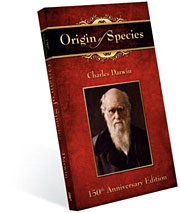Yeah okay, he is from Minnesota, but still!
On Saturday night I was pleased to be able to see one of my favourite bloggers, PZ Myers of Pharyngula, speak on “the war between science and religion”, thanks to the Humanist Association of Manitoba.
Although I wasn’t sure how the topic related to Canada, American issues tend to spill over the border so it was relevant nonetheless. (The talk was recorded, but I’m not sure where or when that will be posted. I’ll post a link as soon as I find out.)
The main point that PZ was trying to get across was that atheists need to be “out”, and unafraid to talk about atheism, unafraid to criticize religion, and unafraid to criticize ideas that contradict science. I agree with him. I think that atheists are afraid to talk about their lack of beliefs for fear of offending somebody, this is certainly something I’m guilty of. I have the Out Campaign “A” on my blog, but I still have close friends and family members from whom I hide my atheism.
The conversation on beliefs really needs to be opened up. Even among atheists, there seems to be a tendency to think that we should just stay quiet and avoid causing a ruckus. But maybe it’s this tendency that makes it okay for religious  people to deride atheists, and maybe it’s the fact that atheists are such a closeted group that makes them America’s least-trusted minority.
people to deride atheists, and maybe it’s the fact that atheists are such a closeted group that makes them America’s least-trusted minority.
After PZ’s talk was over, I had a conversation with my mom about whether his cracker controversy was really necessary. If you don’t know the story, you can read his blog post about it here. The short version is that he desecrated a communion wafer…but really, read his version. I know that a lot of people think this whole thing was a silly exercise that accomplished nothing more than pissing off loads of Catholics. That was my first reaction. Think about it though, all he did was trash a cracker (as well as some pages from the Qur’an and the God Delusion). What he really did was demonstrate how ludicrous religious thinking can get. Some of the emails he received from angry Catholics illustrated how some people put the importance of the cracker above the importance of other human beings.
He has posted some of these emails on his blog, but one in particular that he showed at the talk really shocked me. It basically said that desecrating the wafer was worse then the holocaust or 9/11. Seriously. This is the kind of thinking that needs to be challenged publicly. PZ did something utterly harmless: he threw a few things that he didn’t hold sacred into the trash, and by doing this he was showing that not everyone was bound by superstitious beliefs. That’s something I can support.
What was your reaction to “The Great Desecration”?
Moving along…
My favourite part of lectures is pretty much always the question period, and there were a couple of questions in particular that stood out.
First, there was a local blogger (if you end up here let me know because I’d like to read your blog!) who mentioned that Canada doesn’t have any official separation of Church and state. I actually didn’t know this…I had made some lazy attempts to find out whether we had something similar to the US’s establishment clause, but came up empty. His question was did PZ think that we would benefit from making the separation of Church and state official. PZ’s answer, briefly, was no, and I agree. It might come in handy on occasion, but Canada has done great without it, compared to the US with its White House Faith-based initiatives, its national prayer breakfast, and its presidents (both the current and the previous) that can’t seem to make it through a speech without mentioning god or Jesus.
What do you think? Should Canada have an official separation of Church and state?
Second, a brave creationist showed up! His question: What do you have to say about molecules to morals? It was a weird question, but pretty much just a different wording of “can you be good without god?” PZ handled this well, and you can read the discussion on this in the comments on his blog, but how would you answer?
I’m always puzzled by this idea that we need someone (a god) to tell us what to do in order to be good. It just makes sense: if I don’t want to be harmed, I won’t do harm to other people.
Time to wrap this up…I’ll conclude by saying that I think atheists in general are moral and thoughtful people, and we should be loud and proud of our ability to think for ourselves. Cheers!
 planning to tell the Genesis story in 3D. I think a depiction of the creation of the Earth and the story of Adam and Eve could make for a visually stimulating movie experience.
planning to tell the Genesis story in 3D. I think a depiction of the creation of the Earth and the story of Adam and Eve could make for a visually stimulating movie experience.




 at their display on evolution. So far so good, it’s great that he’s taking the time to consider the evidence for evolution. The mounds and mounds of good evidence. But I guess considering the evidence wasn’t on his agenda because this his summary of the visit:
at their display on evolution. So far so good, it’s great that he’s taking the time to consider the evidence for evolution. The mounds and mounds of good evidence. But I guess considering the evidence wasn’t on his agenda because this his summary of the visit:



Recent Comments